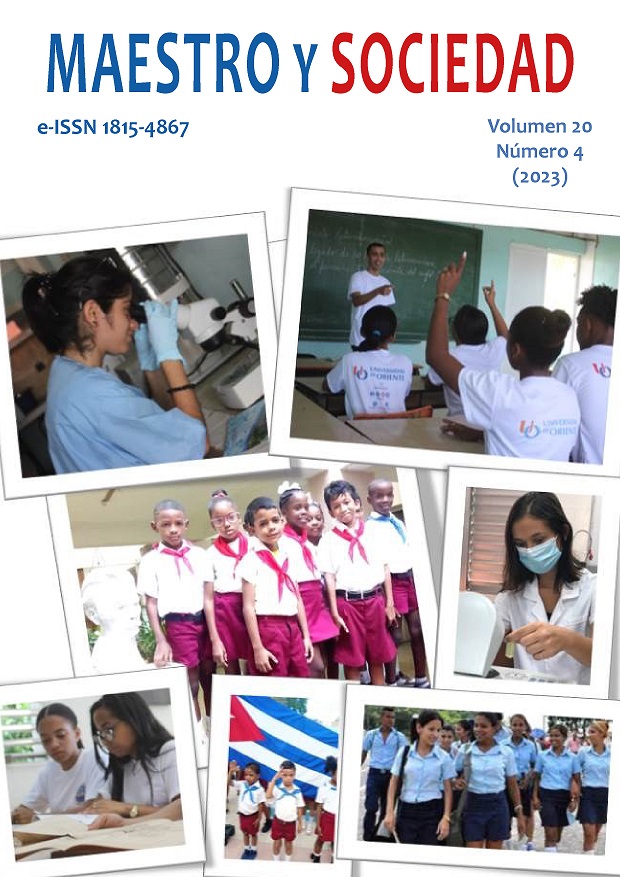Artificial Intelligence in the teaching-learning Process
Keywords:
Artificial Intelligence, Education, Teaching Resources, ChatGPTAbstract
The use of technology in education has evolved significantly, with AI-powered chatbots like ChatGPT making a notable
impact. During the COVID-19 pandemic, online education saw a rapid rise, and learning management systems played
a crucial role in facilitating virtual classes. However, the introduction of ChatGPT in 2022 sparked diverse opinions on
its potential to enhance personalized learning or reduce human interaction. The study explores how chatbots can be
constructively utilized to improve education while considering limitations, such as the AI's inability to replicate human
empathy fully. In conclusion, when integrated responsibly with traditional teaching methods, chatbots can be valuable
allies in enhancing student's learning experiences and empowering educators in the digital age.
References
“ChatGPT.” Accessed July 23, 2023. https://chat.openai.com/
Arce-Castro, J., & Bello, L. (2022). Editora Artemis. LABORATORIOS VIRTUALES PARA LA ENSEÑANZA APRENDIZAJE DE QUÍMICA GENERAL EN EL MODELO HÍBRIDO DE FORMACIÓN, II-152–163. https://doi.org/10.37572/EdArt_27082265111
Bard, https://bard.google.com/
Bello, L. (2022). Editora Artemis. TEACHING A CHEMISTRY COURSE IN BLENDED MODALITY, 1-138–145. https://doi.org/10.37572/EdArt_27082264413
Bello, L. (2023) Curso en línea: Principios de Química. Editora Atena, Julio 2023. DOI 10.22533/at.ed.3292325073 https://www.atenaeditora.com.br/catalogo/post/curso-en-linea-principios-de-quimica
Belloch, C. (2012) Las Tecnologías de la Información y Comunicación en el aprendizaje. Material docente [online].Departamento de Métodos de Investigación y Diagnóstico en Educación. Universidad de Valencia. http://www.uv.es/bellochc/pedagogia/EVA1.pdf Accessed July 24, 2023
Borenstein, Jason, and Ayanna Howard. “Emerging Challenges in AI and the Need for AI Ethics Education.” AI and Ethics 1, no. 1 (October 6, 2020): 61–65. https://doi.org/10.1007/s43681-020-00002-7
Cervantes-Montero y colaboradores, 2022“Vista de Experiencias En El Uso de La Tecnología Educativa En El Período Covid-19 En La Universidad de Oriente.” Accessed July 24, 2023. https://maestroysociedad.uo.edu.cu/index.php/MyS/article/view/5371/5003.
Claude, https://claude.ai/chats
Kurvinen, Einari, Jussi-Pekka Järvinen, and Erkki Kaila. “ARTIFICIAL INTELLIGENCE IN EDUCATION – WHERE ARE WE NOW?” In Education and New Developments 2022 – Volume 2. In Science Press, 2022. http://end-educationconference.org/wp-content/uploads/2022/07/2022v2end087.pdf.
Saltman, Kenneth J. “Artificial Intelligence and the Technological Turn of Public Education Privatization: In Defence of Democratic Education.” London Review of Education 18, no. 2 (2020). https://doi.org/10.14324/lre.18.2.04
Xu L, Sanders L, Li K, Chow JCL. Chatbot for Health Care and Oncology Applications Using Artificial Intelligence and Machine Learning: Systematic Review. JMIR Cancer. 2021 Nov 29;7(4):e27850. doi: 10.2196/27850. PMID: 34847056; PMCID: PMC8669585.
Published
How to Cite
Issue
Section
License
Copyright (c) 2023 Luis Bello, Francisco Rafael Martínez Sánchez

This work is licensed under a Creative Commons Attribution-NonCommercial-NoDerivatives 4.0 International License.
This journal provides immediate open access to its content, based on the principle that offering the public free access to research helps a greater global exchange of knowledge. Each author is responsible for the content of each of their articles.



























 Universidad de Oriente
Universidad de Oriente 